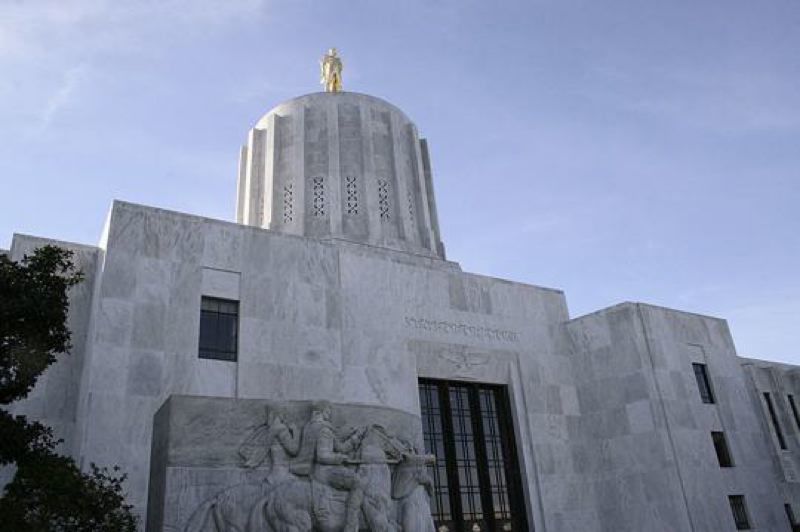Oregon House finally OKs $250 million for summer programs
Published 12:47 pm Friday, April 2, 2021

- Oregon State Capitol
After being sidetracked by a partisan dispute for the better part of three days, the Oregon House voted Thursday night for legislation that includes $250 million for summer educational and recreational programs for students statewide.
The money is contained in one of three bills to rebalance the current two-year state budget. All of the bills passed, 55-0, and went to the Senate. The discussion took less than 15 minutes.
Trending
Gov. Kate Brown and legislative leaders from both parties have signaled their support. The Legislature’s joint budget committee approved the measures two weeks ago.
“Oregonians are depending on this essential aid,” House Speaker Tina Kotek, D-Portland, said in a statement after the votes. “We’ve spent the last year responding to crisis after crisis. As our state continues to recover from the many challenges 2020 brought, this funding package will make urgent investments to help Oregonians who are truly hurting.”
Included in the summer package are these programs:
• For high school students behind on their credits for the past two academic years because of the coronavirus pandemic, $71.9 million, with school districts putting up a 25% match from federal pandemic aid they will get separately. Districts qualify for money if half of high school students participate.
• For students from kindergarten through fifth grade, $93.7 million, with school districts putting up a 25% match, for academic or other enrichment programs. Districts will get money based on the distribution formula for regular state aid, but more weight will be given to students at the poverty level. Assuming a cost of $1,800 per student, the state estimates that up to 70,000 children could benefit.
• For child care, $30 million, plus $10 million in federal funds.
Trending
• For preschool programs, $12 million. plus $11.2 million in federal funds, for one-time activities this summer.
• For summer recreation activities, $40 million that the Oregon Community Foundation will award in grants to public agencies and nonprofit groups, such as the YMCA and Boys and Girls Clubs.
• For parents whose children have disabilities, suffer from trauma or are at risk of placement into the child welfare system, $1.2 million. The state estimates this program could support about 600 parents.
Money not spent by Jan. 1 will return to state coffers.
Kotek said she expects as much as $75 million in federal funds from districts and the Employment-Related Day Care program to match the $250 million.
The $250 million package is attached to a larger bill that enables lawmakers to rebalance the budgets of state agencies before the close of the two-year state budget cycle on June 30. Some of the proposed spending for summer programs will carry over into the next cycle, which starts July 1.
Reading stalls vote
The votes on three budget bills were stalled in a dispute between majority Democrats and minority Republicans, who sought to slow down the lawmaking process by declining to waive the constitutional requirement of every bill being read aloud before a final vote. Republicans have insisted on the House limiting itself to budgets and legislation with a “bipartisan consensus.”
The reading aloud of House Bill 2111 — a bill that simply renames the Oregon Liquor Control Commission as the Oregon Liquor and Cannabis Commission, but was 170 pages long — took the better part of three days. Kotek allowed the chief clerk’s office to use computer software, rather than the human staff, to read the text. The marathon reading ended at 7:30 p.m. Thursday. That bill passed on a 54-1 vote with little discussion.
“This is the kind of focused work that Oregonians need from us right now,” House Republican Leader Christine Drazan of Canby said in a statement before Thursday night’s session. “We will continue to find ways to collaborate on priority issues like a balanced budget.”
Rep. Dan Rayfield, a Democrat from Corvallis and the House’s chief budget writer, said the budget rebalancing bill — which is normally routine — was different this time because of millions in federal and other funds that the state needed to cope with the pandemic and the Labor Day wildfires.
The main bill will save $21.5 million in the tax-supported general fund, but add $567.8 million in federal funds and $898.2 million in other funds. Other bills adjust lottery proceeds, which have bounced back from reduced projections during the pandemic, and spending on capital projects.
Other spending
Other items of note:
• $3.7 million total in grants to 11 local governments, including $220,000 to the city of Estacada, for repair of Labor Day wildfire damage.
• $20 million total in grants to seven local governments, including $2.5 million for the city of Bend, for navigation centers that help people find housing and other services.
• $20 million from marijuana sales taxes during this budget cycle for the Oregon Health Authority to start work on the new addiction recovery centers that Oregon voters approved in Measure 110 last year. Senate Bill 846, which the House has not yet considered, would set the start date for the new centers on Jan. 1, instead of Oct. 1 as stated in Measure 110.
• $2.9 million to the Oregon Food Bank to enable it to make emergency food purchases. The food bank and its network of 20 regional banks received $2.9 million in December to cover emergency purchases for the first three months of this year.
• $15.7 million in federal funds from the National Guard Bureau for construction of a third barracks and associated buildings at Camp Umatilla, an Oregon National Guard training center in Hermiston. The original federal grant for two barracks was $11.3 million.
The Senate already has passed bills to implement program changes, including the new deadlines for actions under Measure 110, and extend spending authority to state agencies that do not have 2021-23 budgets approved by the start of the new cycle on July 1. The House has yet to act on those bills.





